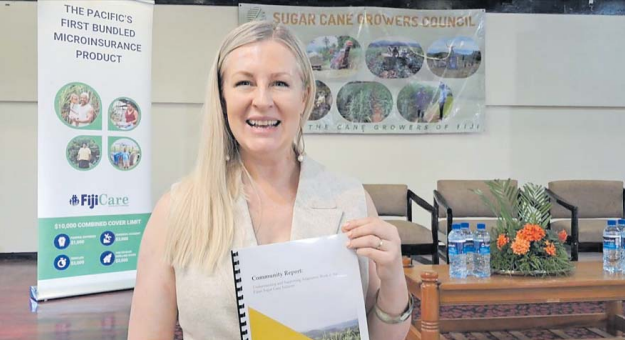ENVIRONMENTAL change is significantly reshaping work for cane farmers in the sugar industry in Fiji.
This was highlighted by University of Sheffield politics and international relations lecturer Dr Vanessa Burns in Lautoka while presenting her report on understanding and supporting adaptation work in the sugar cane industry.
New work
Dr Burns said the report highlighted how environmental change was profoundly reshaping the daily work of cane farmers.
“We have seen that unpredictable weather patterns, extreme weather and heavy rainfall are leading to new types of work, increased workloads and altered working conditions,” Dr Burns said.
“This often results in farmers spending significantly more time on agricultural tasks that would not have been necessary if not for environmental disruptions.
“Cane farmers are performing new types of work, for example, night work, work for new reasons because of heat stress and working in changed conditions, example is increased rainfall during the harvest season.”
Increased workload
Dr Burns said there was evidence of significant increases in work over the growing and harvesting seasons that would not have occurred if not for environmental change.
“There is also evidence of an increases in work that contributes, or intends to contribute, to adaptive strategies (where adaptation is in response to environmental change).
“Evidence shows that cane farmers are spending significantly more time (more than 30 per cent) on agricultural work.
“This is due to the disruption, duplication and delay of specific work tasks over the calendar year as a direct result of unpredictable weather patterns, extreme weather, and heavier rainfall.”
Exposure to hazards
She said evidence shows that cane farmers were exposed to more hazards because of environmental change.
“These remain unassessed from a risk assessment perspective, but include hazards associated with wetter conditions, heat stress, floods and increased severity of cyclones.”
Geographical risk
Dr Burns said coastal flatlands were more at risk of flooding, saltwater inundation and saltwater intrusion.
“This exacerbates land and food security in these regions, particularly where there is poor or no access to informal social protections from family or community.
Distribution of burdens
“Evidence shows that increased labour burden caused by climate change is distributed in various ways.
“These include depending more on whole family labour, individuals undertaking more work, diversifying into other crops, and diversifying into other income streams.
“The increase in the amount of work needed to produce the same or reduced tonnage exacerbates labour shortages. The informal and unplanned nature of the labour changes means they are difficult for farmers and the institutions that support them to recognise and measure.
Resilience
“Evidence showed that farmers were more resilient to the above impacts where there were more equitable arrangements for harvesting, where forms of informal social protection were available at the community level to support loss and damage, and where farmers had better land security.”
Institutional support
Dr Burns said farmer participants responded positively to questions regarding institutional support.
“This included feeling that there were good opportunities for dialogue with the Ministry of Multi-Ethnic Affairs and Sugar Industry.
“Farmers reported feeling supported in resolving problems and represented by the Sugar Cane Growers Council in matters that concerned them.
“They also reported good opportunities for knowledge exchange with Sugar Research Institute of Fiji (SRIF), and good levels of support and service from the Fiji Sugar Corporation Limited.
“This suggests an excellent basis for support in navigating industry changes connected to environmental change.
“Farmers are facing increased exposure to hazards like wetter conditions, heat stress, floods, and heightened severity of cyclones, which remain largely unassessed from a risk perspective.
“The burden of this ‘adaptation work’ — the ongoing effort of preparing for, living through, and recovering from climate impacts — is distributed in various ways, often relying on whole family labour and leading to unplanned, informal tasks that are difficult to measure and support.
“Despite these challenges, the research found strong positive responses regarding institutional support from key industry bodies.
“This suggests a robust foundation for supporting farmers as they navigate these changes.
“Recognising this crucial and often unseen adaptation work is the vital first step toward understanding its true extent and ensuring that those on the front lines of climate change receive the necessary support for a just and sustainable future in Fiji’s sugar industry.”



